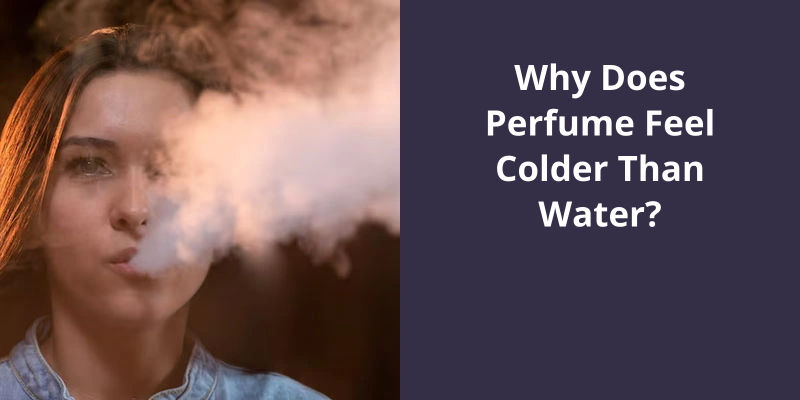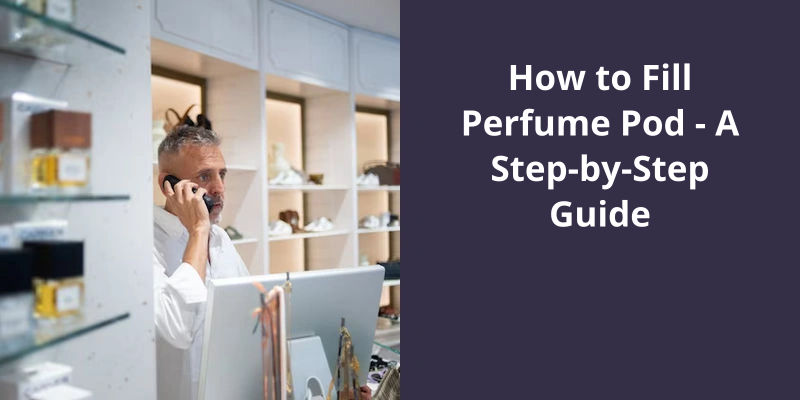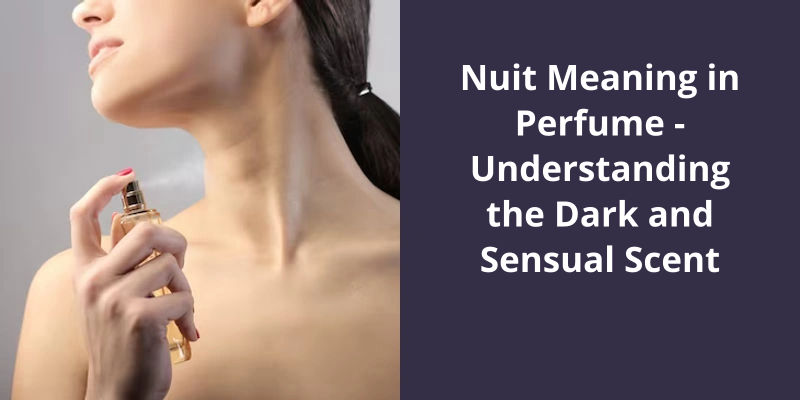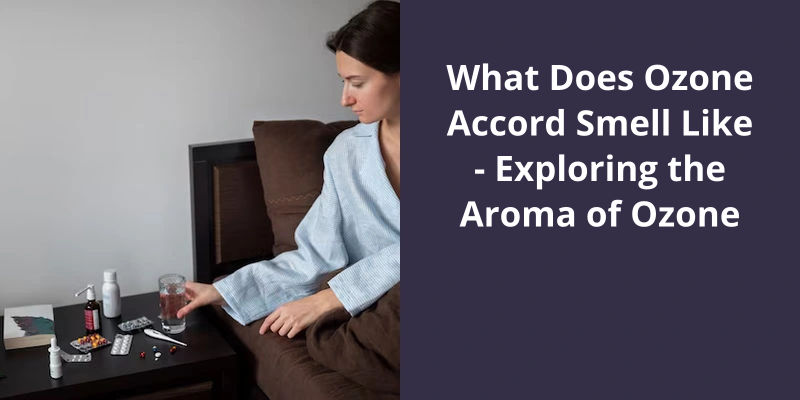The reason perfume feels colder than water is due to the alcohol content in it. Alcohol, which is a significant constituent of perfume, evaporates more quickly than water. When you spray perfume on your skin, this swift evaporation process draws heat from your skin, creating a cooling sensation. This process, called evaporative cooling, is faster and more noticeable with alcohol than it is with water. So, when you compare, the quicker evaporation of perfume makes it feel colder than water.

Why Does Spraying Perfume on Body Produces Cooling Sensation?
The phenomenon of spraying perfume and feeling a cooling sensation is attributed to evaporation. Evaporation is a process by which a liquid changes to a gas without any external heat supply.
The cooling sensation can also be attributed to the ingredients in the perfume. These ingredients stimulate the receptors in the skin, giving a chilly sensation.
This evaporation cools the surface of the skin, creating a cooling effect.
The next time you spray your favorite perfume and feel cool, remember that it’s all due to science!
The Science Behind Perfume Ingredients and Their Effects on the Skin
Perfume ingredients consist of natural and synthetic substances that have different effects on the skin. Some ingredients can cause irritation or allergic reactions, while others have moisturizing or calming properties. The science behind perfume ingredients involves studying their chemical composition and how they interact with the skin. This knowledge helps perfumers create fragrances that are safe, effective, and pleasant to wear.
Understanding the science behind perfume evaporation is essential for anyone who enjoys wearing this popular fragrance. Perfume is composed of different compounds that can vary in their volatility, affecting how quickly the scent evaporates. The speed of evaporation is also influenced by different environmental factors, such as temperature and humidity. In this article, we will explore some of the key elements that impact perfume evaporation and examine some common misconceptions about this fascinating process.
Does Perfume Evaporate Fast?
This means that perfume can evaporate quickly in warmer environments and may not last as long on the skin. However, the rate of evaporation also depends on the type of perfume and it’s individual ingredients.
These types of perfumes tend to last longer on the skin and may not need to be reapplied as frequently. Additionally, some perfumes contain fixatives or other ingredients that help to slow down the rate of evaporation and prolong the scent.
Spraying perfume directly onto the skin or into the air allows the molecules to disperse more quickly, which can lead to faster evaporation.
Exposure to heat, light, and air can cause the volatile compounds in perfume to break down and evaporate more quickly. To prevent this, it’s best to store perfumes in cool, dark places, away from direct sunlight and sources of heat.
The Impact of Packaging Materials on Perfume Evaporation and Longevity
- Glass bottles can protect fragrance from exposure to light and air, preserving it’s scent and longevity.
- Plastic containers may not provide the same level of protection and can influence the evaporation rate of the fragrance.
- Metal packaging can alter the fragrance composition and potentially affect it’s longevity.
- Porous materials like paper and cardboard can absorb fragrance molecules, leading to a decrease in longevity over time.
As we know, perfumes are one of the most popular accessories adding to our personality and style. But have you ever wondered whether the weather affects the longevity of our beloved fragrances? It’s a valid question, and the answer is yes! Turns out, perfumes do last longer in cold weather. Let’s dive deeper into the science behind it.
Do Perfumes Last Longer in Cold Weather?
In general, when considering the question of whether perfumes last longer in cold weather, there are a range of factors that can come into play. For instance, different fragrances may react differently to variations in temperature and humidity, and this can impact their staying power over time.
Additionally, some perfume wearers may choose to apply their fragrance differently in colder weather, concentrating it more on the pulse points or layering it with scented lotions or oils to enhance it’s staying power. Ultimately, the best way to determine how well a particular fragrance will perform in cold weather is to experiment with different scents and see which work best for your personal taste and style.
The Science Behind How Cold Weather Affects Perfume Ingredients
- The main ingredients in perfume are called volatile organic compounds (VOCs).
- Low temperatures can cause VOCs to evaporate more slowly, making the scent last longer.
- Cold weather can also cause some ingredients, such as citrus and floral notes, to become muted or less noticeable.
- In contrast, spicy and woody scents may become more prominent in cold weather.
- The temperature at which perfume is stored can also impact it’s longevity and overall scent profile.
- Overall, the science behind how cold weather affects perfume ingredients is complex and varies based on each individual fragrance’s specific composition.
Source: Does cold damage fragrances?
In understanding why perfume or aftershave evaporates quicker than water, we must delve into the physical properties of the fluids used. Unlike water, perfume has a volatile base, often alcohol, which has a higher vapor pressure, resulting in faster evaporation. This gives perfume it’s distinct aroma, making it an essential part of daily grooming and self-care.
Why Does Perfume or Aftershave Evaporate Quicker Than Water?
Moreover, the molecular weight of the components in perfume or aftershave is usually lower than that of water. This means that each molecule in the perfume has a lower mass than a molecule of water. As a result, it requires less energy for perfume molecules to escape the liquid and enter the air as compared to water. This phenomenon is known as the kinetic theory of evaporation. Therefore, perfume or aftershave, which contains volatile organic compounds (VOCs), evaporates faster than water due to it’s lower molecular weight.
Typically, these fragrances contain numerous organic compounds, which have low boiling points. Moreover, these compounds can easily be converted from a liquid to a gas. Due to their low boiling points, the pressure that’s exerted by these compounds on the air is higher as compared to water. This process is called vaporization and it’s the reason behind the pleasant fragrance that we get when using perfume or aftershave.
Viscosity is a measure of how much resistance a fluid offers to flow. Liquids with high viscosity tend to be thick and sticky, like honey. On the other hand, liquids with a low viscosity are runnier. This means the fragrance can flow and vaporize more quickly, causing it to evaporate faster than water.
Glass containers retain heat well and allow for rapid evaporation as there’s little insulating material around the liquid. On the other hand, plastic or metal containers inhibit heat transfer and, therefore, reduce the evaporation rate.
It’s a common misconception that storing perfume in the fridge makes it smell stronger. While it does have the potential to keep fragrances from spoiling, the truth is that it can actually harm the delicate chemical balance of the perfume. That being said, not all fragrances are created equal, and some may fare better in the fridge than others.
Does Putting Perfume in the Fridge Make It Smell Stronger?
There’s a widespread belief that storing perfume in the fridge can make it smell stronger. Some people even swear by this age-old technique, claiming that it enhances the fragrance and helps it last longer. However, the science behind this theory remains uncertain, and there’s no conclusive evidence to support it’s effectiveness.
The main argument in favor of refrigerating perfume is that lower temperatures can slow down the evaporation rate of the fragrance, thereby prolonging it’s longevity. Additionally, some perfume enthusiasts suggest that the cool air of the fridge can help preserve the delicate notes of the scent, allowing it to remain true to it’s original composition.
Perfumes contain a delicate blend of ingredients, including alcohol, essential oils, and water. These components are carefully balanced to create a harmonious scent, but exposure to extreme temperatures can upset this balance.
Furthermore, perfume bottles aren’t designed to withstand the fluctuating temperatures of the fridge. The sudden changes in temperature can cause the glass to expand and contract, which can lead to cracks and leaks. This, in turn, can cause the fragrance to evaporate more quickly and lose it’s scent.
Instead, it’s best to store your perfume in a cool, dry place away from direct sunlight and heat sources to ensure it’s longevity and quality.
Now that we understand the science behind why perfumes feel cold, let’s explore some other interesting facts about perfumes and their impact on our senses.
Why Is Perfume So Cold?
However, this phenomenon is more prominent with perfume due to it’s volatile nature. Perfume contains a high concentration of volatile compounds that can easily escape as a gas into the surrounding air. These molecules have a low boiling point, which means they can evaporate easily at room temperature. As they evaporate, they absorb heat from their surroundings. This process causes the air around the perfumed area to become cooler than the rest of the room, creating a feeling of coldness.
Moreover, the cooling effect of perfume is also dependent on the type of fragrance used. Additionally, perfume molecules are often small and light, which makes them more prone to vaporization. This is often why high-end perfumes can be more expensive, as they contain more volatile compounds, and as a result, create a stronger cooling effect.
Furthermore, perfume manufacturers often use alcohol as a solvent to dissolve the fragrance compounds. Alcohol evaporates rapidly and efficiently, making it easier for the fragrance molecules to escape into the surrounding air. Alcohol also has a cooling effect, which enhances the overall experience of wearing perfume and feeling it’s cooling sensation. However, excessive use of alcohol in perfume can lead to dryness and irritation on the skin.
The sensation of coldness can create a feeling of freshness and invigoration, making the wearer feel more alert and awake. This may explain why some individuals prefer to use perfume when they’re feeling tired or sluggish.
The Science Behind the Composition of Perfumes and the Specific Compounds That Contribute to Their Cooling Effect.
This topic explores how perfumes are made and what specific chemicals are included to create a cooling sensation.
Conclusion
In conclusion, the sensation of coldness that we experience when applying perfume to our skin can be attributed to the process of evaporation, where the molecules of the liquid draw energy from our skin to transition into a vapor state. This causes a loss of heat from the surface of our skin, leading to a feeling of coolness. It’s fascinating to consider how the simple act of applying perfume can create such a unique and distinct sensation, reminding us of the complex interplay between science and our senses. As we continue to explore the mysteries of the natural world, explanations like these serve as a reminder of the complexity and beauty that exists all around us.





